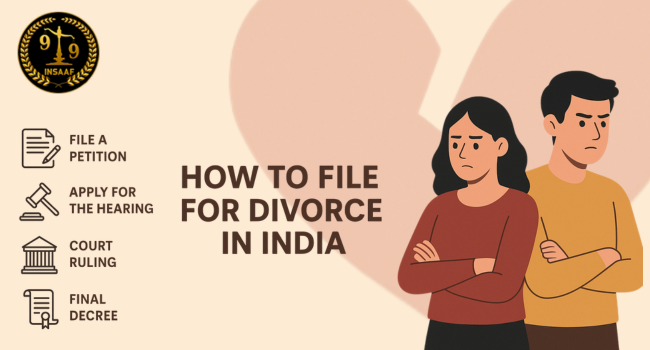Published
Updated: August 27, 2025
How to File for Divorce in India - Mutual & contested divorce

Understanding the Divorce Process, Laws & Contested Divorce Scenarios
In India there are various legal systems that regulate divorces depending on a person's religious background and personal law registration. The process of seeking divorce stands as a deeply personal choice which creates emotional difficulty yet the understanding of legal procedures will help people to handle this period with better resolve and comprehension. In this article we will provide a detailed explanation of Indian divorce procedures that targets both cases of mutual divorce agreement and contested divorce between couples.
Indian society has become increasingly conscious of divorce rights during the past few years. People now seek divorce and gain success in legal divorces because society acknowledges this path as a proper way to terminate marriage in abusive or unhappy relationships. The legal system of India is quite challenging to understand even when personal emotions remain high during this stressful period.
Each religious community in India operates under its separate laws which govern the process of divorce. People who wish to file for divorce must understand the specific rules which differ between religious communities.
Also Read :- Procedure one Should Know about Mutual & Contested Divorce in India
Types of Divorce in India
Mutual Consent Divorce: A mutual consent divorce stands as the easiest and quickest route to divorce which produces minimal conflict during the process. The term mutual consent explains that both spouses jointly choose to terminate their marriage without conflict.
Key features:
• Both spouses agree to separate
• The waiting period required before submitting a petition is one year during which couples must live apart.
• A period of cooling off of typically six months follows the filing of divorce papers.
• Couples solve their divorce disputes concerning child support, property distribution and child custody arrangements jointly
Contested Divorce Filing a contested divorce becomes essential when spouses fail to agree either on termination of their marriage or terms of their separation. Either one spouse files for divorce the other opposes the step or major issues between them create substantial conflicts.
Key features:
• One spouse can file for divorce against their partner.
• Each person needs specified causes for their divorce from their own religious law book
• Typically, longer and more complex legal process
• The process includes several court appearances during presentations of different evidence.
• The judge controls who gets the custody of child and who receives visitation rights and monetary support while dividing joint property
The Indian Procedure to File Divorce Cases
Step-by-Step Guide for Mutual Consent Divorce
Consult A Lawyer: Start by consulting with a professional attorney to understand all the legal aspects of getting divorced.
Get the Petition Drafted: Your attorney creates a divorce petition with our legal details when you work together
• Marriage Details
• Reasons for separation
• In establishing terms within your divorce that show how you will care for the children and how you will share our assets plus expenses.
File Petition in the Family Court: for the area you live in while both parties need to attend. Both parties must attend the filing session together.
First Motion Hearing: During the initial court session both partners need to explain that they agree to end their marriage.
Cooling Period: A court requires couples to wait six months before granting their divorce except in rare situations that merit exceptions.
Second Motion Hearing: After the waiting time ends both spouses need to go back to court to show their desire for divorce.
Final Decree: After verifying both parties' requirements the court gives formal termination of marriage documents.
Steps for Contested Divorce
Legal consultation: Engage a qualified divorce attorney familiar with the applicable personal laws.
File Petition in the Family Court: Your attorney will create a divorce document and list the valid reasons for dissolution.
Serving of Notice: The court organization delivers a formal notification to the person being sued.
Response Filing: After being served with the notice the responding party presents a legal response that disputes the claims made in the initial filing.
Submission of Evidence: Both parties present their supporting documents at this stage.
Examination and Cross-examination: The court will invite expert testimonies and testifies under direct and opposite questioning.
Presenting of Arguments: Lawyers explain their points to the court using both evidence and legal requirements.
Judgement: After looking at every aspect of the case the court declares its final decision.
Appeals: The involved party may file an appeal with a higher court when they disagree with the legal ruling.
Grounds for Divorce under Indian Law
Hindu Marriage Act (Section 13)
Hindus Buddhists Jains and Sikhs have the following conditions to end their marriage
• Adultery
• Cruelty (physical or mental)
• Desertion for at least two years
• Conversion to another religion
• Mental disorder or insanity
• Incurable or communicable disease
• Religious individuals leave the world to live as ascetics.
• A person can assume someone died after staying absent for seven years and more
Muslim Personal Law
A person following Muslim laws must use separate divorce rules depending on their Sunni or Shia belief.
For men:
• The husband can end his marriage through Talaq which he declares alone.
• Khula (divorce at wife's instance with husband's consent)
• Mubarat (divorce by mutual consent)
For women:
• A woman may divorce her husband by returning her marital property known as mehr/dower through the procedure of Khula.
• The court will step in and end the marriage if one presents evidence showing cruelty, desertion or the period of delay in return.
• Cruelty
• Desertion
• Failure to provide maintenance
• Imprisonment of husband
Indian Divorce Act (Christians)
Under Christian matrimonial law a person can divorce when these reasons apply.
• Adultery
• Cruelty
• Desertion for at least two years
• Conversion to another religion
• Unsoundness of mind
• Communicable disease
• Presumption of death
Special Marriage Act
When Hindus or interfaith couples avoid religious ceremonies, they can use the Special Marriage Act that lets them divorce under Hindu Marriage Act parameters.
Understanding the Procedures of a Contested Divorce in Indian Society
A contested divorce requires a lot more effort and demands a higher emotional toll on both parties than when they both agree to the divorce. Next steps for each person appear below.
Common Contested Grounds
People often base their divorce applications on this major reason which consists of these components:
• Physical violence
• Mental harassment
• Emotional abuse
• Denial of basic necessities
• Economic deprivation
Desertion: Abandonment without reasonable cause for at least two continuous years.
Adultery: Voluntary sexual intercourse outside marriage. Proof must be strong yet evidence from direct sources is notoriously hard to find.
Mental illness: Someone with lasting mental illness becomes unable to live together with their partner.
Legal Procedures and Timeline
A contested Divorce Typically Involves:
Evidence Collection: During evidence gathering both parties present documents to back up what they claim occurred.
• Medical reports (in cases of physical cruelty)
• Police complaints
• Call recordings
• Witness testimonies
• Financial documents
Court Proceeding: The legal process needs multiple hearings through many months to several years.
Interim Relief: At different stages of proceedings the court can authorize temporary measures including:
• Temporary maintenance
• Child custody and visitation
• Protection orders
• Residence arrangements
The courts of India need various amounts of time to process contested divorces because of busy docket schedules. These cases take between 2 and 5 years on average and may take longer if court cases become very complicated.
Challenges Involved
Emotional Burden: Lawful fights that drag on for long periods create heavy emotional burden.
Financial Stress: You need money to pay lawyers plus court expenses while running the risk of losing shared possessions.
Privacy Concern: People must share private details through formal court records.
Impact on Children: Children normally experience considerable emotional damage due to marital breakdown.
Social Stigma: Communities throughout India still judge divorced couples socially despite shifting cultural attitudes towards divorce.
The Legal Path to Divorce in India Includes Specific Timeframes and Expense Details
Expected Duration
Mutual Divorce: The timeframe for a divorce based on mutual agreement reaches 6 to 8 months when including the necessary cooling-off period.
Contested Divorce: Dissolving a disputed marriage takes approximately 2-5 years while mutual consent divorces take about six to eight months.
Role of Family Courts:
India put Family Courts in place under the Family Courts Act of 1984 to deal with marriage disagreements. These courts aim to:
• Promote conciliation and speedy settlement
• The court setting makes families feel more comfortable when they walk through its doors
• Protect the privacy of proceedings
• The court’s main focus remains the best interests of every child involved in a case
Understanding Indian Laws About Divorce
Key Statutes
• Hindu Marriage Act, 1955: Governs divorce for Hindus, Buddhists, Jains, and Sikhs
• Muslim Personal Law (Shariat) Application Act, 1937: Applies to Muslims, with varying interpretations
• Indian Divorce Act, 1869: Applies to Christians
• Parsi Marriage and Divorce Act, 1936: For the Parsi community
• Special Marriage Act, 1954: For inter-religious marriages and civil marriages
• Foreign Marriage Act, 1969: For marriages between Indians abroad
Also Read :- Indian law for second marriage without divorce
Women's Rights and Child Custody
The Indian judicial system now grants women stronger rights during their divorce cases
Maintenance and Alimony: The law awards women the right to receive funds based on their spouse's employment earnings plus their normal way of living.
Streedhan: It gives a woman complete control over all gifts and possessions she earned before or during her marriage.
Protection Against Domestic Violence: Under the Protection of Women from Domestic Violence Act, 2005
Child Custody: Courts distribute child considering child’s best interest but normally grant main custody to mothers of young children
Alimony and Maintenance
Interim maintenance: Financial support during ongoing proceedings
Permanent Alimony: After ending their marriage both partners receive alimony funds that continue until further notice.
Factors Considered: The court will assess how much money and property both partners own alongside their marriage's length and how much money children need to survive
Conclusion: The process of filing for divorce in India follows multiple specialized legal systems that depend on personal laws of each person involved. People experience smoother divorces when they agree while processes that parties fight over take a long time and create great emotional strain.
Insaaf99 is an online lawyer consultation platform that offers a wide range of legal services across India. We provide access to experienced divorce lawyers available pan-India.



